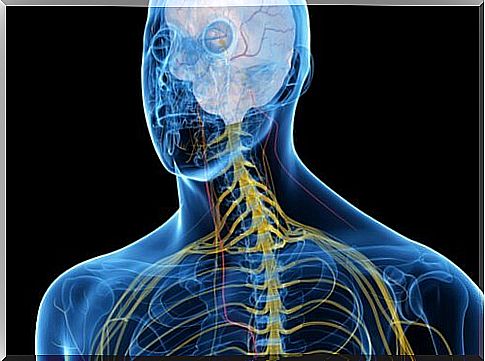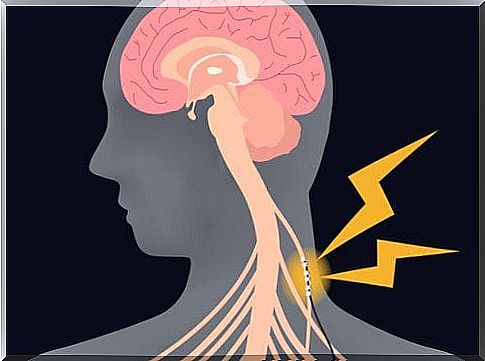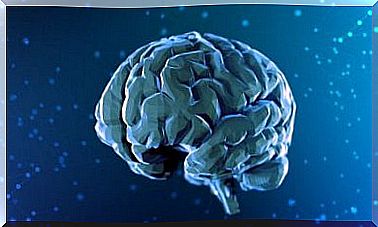How To Stimulate The Vagus Nerve To Improve Mental And Physical Health

The vagus nerve is an essential part of the parasympathetic nervous system. It influences breathing, digestive function and heart rate, in addition to influencing mental health. This is why optimizing the function of this nerve can improve our health, by strengthening our defenses against stress.
The increased vagal tone activates the parasympathetic nervous system. Having a high vagal tone means that the heart can relax more quickly after an episode of stress.
In fact, in 2010, researchers discovered a positive feedback circuit between high vagal tone, positive emotions, and good physical health. In other words, the more the vagal tone increases, the more physical and mental health is improved, and vice versa.
The role of the vagus nerve in the relaxation response
The vagus nerve has many functions, but some of the most important are due to their role as a major component of the autonomic nervous system. This system controls involuntary physical functions, such as heart rate, digestion and breathing.
The autonomic nervous system is divided into two main branches, the parasympathetic nervous system and the sympathetic nervous system. The sympathetic nervous system prepares the body to fight against perceived danger by initiating stress, fight-flight responses.
Rather, the parasympathetic nervous system prepares the body for rest. This relaxed state should be his predetermined state, but in people with stress or anxiety issues, this may not be the case.

The vagus nerve is a main conduit of the parasympathetic nervous system. In addition to initiating the relaxation response, the nerve also influences the reduction of inflammation, the storage of memories, and the maintenance of the body in a state of balance called homeostasis. In addition, the vagus nerve causes the production of many important neurotransmitters, most notably GABA, norepinephrine and acetylcholine.
Signs and symptoms of vagus nerve dysfunction
The health and function of the vagus nerve is strongly related to vagal tone. When the vagus nerve is functioning as it should, the vagal tone is said to be elevated. High vagal tone is linked to good physical health, mental well-being, and resistance to stress.
When the vagus nerve is not functioning as it should, the vagal tone is weak. People who are easily stressed and have problems calming down after a stressful episode may have low vagal tone.
Since one of the many functions of the vagus nerve is to act as a switch for inflammation, low vagal tone often leads to chronic inflammation, a major factor in many diseases of the body and mind, including ADHD, anxiety, depression, Alzheimer’s, heart disease, cancer and diabetes. Plus, low vagal tone is linked to a long list of physical health conditions that range from mild to severe.
The influence of vagal tone on health is widespread and affects many important systems. Hence the fact that some symptoms and disorders related to low vagal tone are as follows:
- Constipation
- Depression
- Diabetes
- Anxiety disorders
- Autoimmune diseases
- Bipolar disorder
- Difficulty swallowing
- Tendency to choke on eating
- Digestive disorders, including gastroparesis
- Hoarseness
- Migraines
- Obesity
- Rheumatoid arthritis
- Sudden drops in blood pressure
- Heart disease, including low heart rate
- Addictions
- Alzheimer’s disease
- Chronic fatigue syndrome
- Epilepsy
Tips for stimulating the vagus nerve
There are many ways to stimulate the vagus nerve to keep the vagal tone high and healthy. Researchers use the term vagus nerve modulation more accurately, which refers to the ability to regulate or balance. So, what stimulates the vagus nerve is actually what tones and strengthens it, just as exercise tones and strengthens your muscles.
A healthier vagus nerve is more receptive, which helps recover from stress faster.

Stimulate the vagus nerve using the mind-body connection
Some body-mind exercises and therapies that help improve vagus nerve tone include the following:
- Singing: singing alone or accompanied stimulates the vagus nerve, according to the study conducted on this subject. When singing with other people, the heart rate is synchronized. It is believed that the vagus nerve is responsible for this phenomenon.
- Meditate: One study found that meditating automatically helps tone the vagus nerve. Additionally, chanting OM has been found to increase vagal tone and at the same time reduce activity in the amygdala, the fear center of the brain.
- Do Yoga: Any kind of moderate exercise can stimulate the vagus nerve, but yoga stands out. Many studies support that it improves vagal tone. For example, one study proved that yoga not only improves vagal tone, but also increases the release of GABA, the relaxation neurotransmitter.
- Do acupuncture: it strengthens the vagal tone. Traditional acupuncture points, and more specifically auricular acupuncture, stimulate the vagus nerve, as the study conducted on this subject has shown.
- Opt for Reflexology: Foot reflexology has been proven to increase vagal tone.
Other ways to stimulate the vagus nerve
Enjoying healthy relationships is another key to maintaining vagus nerve health. In fact, we know that people with a better vagal tone are more altruistic and have more solid and harmonious relationships.
This is partly so because vagal stimulation causes the release of oxytocin, a hormone called a “connecting molecule,” because it promotes union. Oxytocin is linked to human traits such as loyalty, empathy, confidence, and courage.
In this sense, the study found that there is a positive feedback cycle between constructive social connections, positive emotions, and physical health set in motion by vagal tone.
That’s why one way to stimulate the vagus nerve is to get together with friends and have a laugh with them. Laughter strengthens relationships while increasing heart rate variability, a reliable indicator of healthy vagus nerve function.
Finally, we must highlight another way of stimulating the vagus nerve: through food supplements. This is because certain dietary supplements can improve the health and function of the vagus nerve. Among them are ginger root, probiotics (and more particularly Lactobacillus rhamnosus ), essential omega-3 fatty acids (especially DHA) and zinc.










